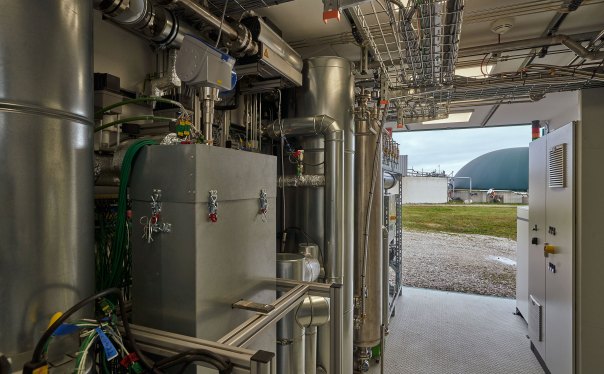Reverion: Revolutionizing Biogas Fuel-Cell Efficiency
The Birth of Innovation
Born inside the prestigious Technical University of Munich, the engineers behind Reverion have spent seven years developing a groundbreaking solution to increase electricity production from biogas and existing fuel-cell technology. This innovative approach aims to push the limits of biogas fuel-cell efficiency, making it a cleaner and more efficient option for generating power.
What is Biogas?
Biogas comes from decomposing waste and is primarily composed of methane, a form of chemical energy that requires conversion into electricity before it can be used in homes. One method to achieve this conversion is by burning biogas, but this process releases pollutants and wastes around half the energy generated. A cleaner and more efficient alternative is to use fuel cells, which produce electricity through an electrochemical reaction, similar to a battery.
The Efficiency Challenge
While fuel cells have an inherent 80% efficiency rate, they still experience limitations that lead to up to 30% of the fed fuel being unused again. Stephan Herrmann, CEO at Reverion, explains this phenomenon: "Fuel cells themselves always have had like 80% efficiency in them, but they have some limits." To address this issue, Reverion has developed a two-step process to re-increase gas quality and recycle it into the fuel cell.
The Revolutionary Approach
Reverion’s innovative solution involves capturing and processing unused gas within the fuel cell. By doing so, the company achieves a remarkable 20% efficiency boost. According to Herrmann, "We get an increase from the best power plant that’s available, of 60%, to 80% just in one step." This significant improvement makes Reverion’s technology a game-changer in the industry.
Industry Standards
Typically, the industry strives for incremental improvements in efficiency, such as a 0.2% increase per year. However, Reverion’s approach redefines the benchmark. Herrmann notes: "Normally, the industry fights for say, a 0.2% increase in efficiency per year.That’s even an achievement.’ We get an increase from the best power plant that’s available, of 60%, to 80% just in one step."
Startup Battlefield Debut
At TechCrunch Disrupt’s Startup Battlefield in San Francisco on October 19, 2022, Stephan Herrmann presented Reverion’s revolutionary approach. The company secured $7 million in seed funding from Germany’s Federal Ministry of Economics and Climate Protection, the European Social Fund, and XPrize.
Pilot Program
With its newfound investment, Reverion is gearing up to pilot 10 modular power plant units, each housed in 20-foot shipping containers with sufficient capacity to power 100 households apiece. The company aims to deliver its first unit by the end of the first quarter of 2023 and all 10 units before the end of the year.
Securing Funding
Reverion’s seed funding was secured from reputable sources, including Germany’s Federal Ministry of Economics and Climate Protection, the European Social Fund, and XPrize. This investment will enable the company to further develop its innovative technology and bring it to market.
The Future of Energy Generation
As the world shifts toward cleaner and more sustainable energy sources, Reverion’s groundbreaking solution has the potential to revolutionize the biogas fuel-cell industry. By increasing efficiency and reducing waste, Reverion is making a significant contribution to the reduction of greenhouse gas emissions and the creation of a more environmentally friendly future.
Conclusion
Reverion’s seven-year journey has culminated in a remarkable innovation that has the potential to transform the energy landscape. With its efficient biogas fuel-cell technology, Reverion is poised to make a lasting impact on the industry and contribute significantly to a cleaner, greener future for generations to come.
Related Articles
- Venture Despite VCs Investing $75B in Q4 , it’s still hard for startups to raise money, data proves
- Failed fintech startup Bench racked up over $65 million in debt, documents reveal
- Climate tech matured in 2024 as investors favored bigger rounds, later stages
- Trump administration might give a boost to deep-sea mining for critical minerals
- Climate tech matured in 2024 as investors favored bigger rounds, later stages



